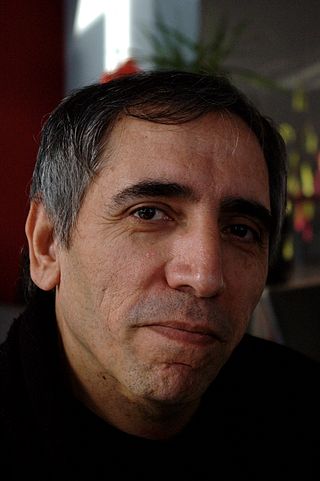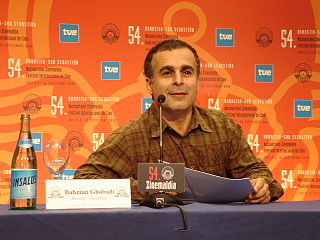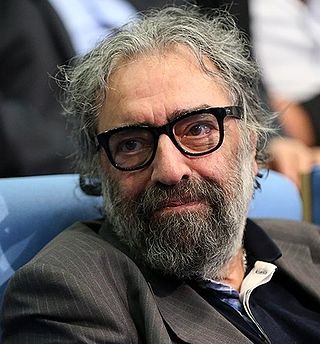Related Research Articles

Abbas Kiarostami was an Iranian film director, screenwriter, poet, photographer, and film producer. An active filmmaker from 1970, Kiarostami had been involved in the production of over forty films, including shorts and documentaries. Kiarostami attained critical acclaim for directing the Koker trilogy (1987–1994), Close-Up (1990), The Wind Will Carry Us (1999), and Taste of Cherry (1997), which was awarded the Palme d'Or at the Cannes Film Festival that year. In later works, Certified Copy (2010) and Like Someone in Love (2012), he filmed for the first time outside Iran: in Italy and Japan, respectively. His films Where Is the Friend's Home? (1987), Close-Up, and The Wind Will Carry Us were ranked among the 100 best foreign films in a 2018 critics' poll by BBC Culture. Close-Up was also ranked one of the 50 greatest movies of all time in the famous decennial Sight & Sound poll conducted in 2012.

Mohsen Makhmalbaf is an Iranian film director, writer, film editor, and producer. He has made over 20 feature films, won 50 awards, and been a juror in more than 15 major film festivals. His award-winning films include Kandahar; his latest documentary is The Gardener and latest feature The President.

Majid Majidi is an Iranian filmmaker and producer. In his films, Majidi has touched on many themes and genres and has won numerous international awards.

The cinema of Iran, or of Persia, refers to the film industry in Iran. Particularly Iranian art films have garnered international recognition. Iranian films are usually written and spoken in the Persian language.

Jafar Panâhi is an Iranian film director, screenwriter, and film editor, commonly associated with the Iranian New Wave film movement. After several years of making short films and working as an assistant director for fellow Iranian filmmaker Abbas Kiarostami, Panahi achieved international recognition with his feature film debut, The White Balloon (1995). The film won the Caméra d'Or at the 1995 Cannes Film Festival, the first major award an Iranian film won at Cannes.

Bahman Ghobadi is an Iranian Kurdish film director, producer and writer. He belongs to the "new wave" of Iranian cinema.

300 is a 2007 American epic historical action film based on the 1998 comic book series of the same name by Frank Miller and Lynn Varley. Co-written and directed by Zack Snyder, with Miller serving as executive producer and consultant, the film is a fictionalized retelling of the Battle of Thermopylae in the Greco-Persian Wars like its source material. The plot revolves around King Leonidas, who leads 300 Spartans into battle against the Persian "God-King" Xerxes and his invading army of more than 300,000 soldiers. As the battle rages, Queen Gorgo attempts to rally support in Sparta for her husband.

Abolfazl Jalili is an Iranian film director and screenwriter. He belongs to the Iranian new wave movement.

Ali Hatami was an Iranian film director, screenwriter, art director, and costume designer. The Tehran Times dubbed him "the Hafez of Iranian cinema due to the poetic ambiance of his movies."

Ebrahim Hatamikia is an Iranian film director, screenwriter, cinematographer and actor. Hatamikia is known for films depicting the Iran–Iraq War's impact on Iran. His films are considered some of the best ever made in the Iranian war cinema and most notable for their attention to social changes brought about by the war. Also, he is best-known for his explorations of the trauma by the war; both on returning soldiers and those who await them, unable to mourn effectively without knowing the fate of their loved ones.

Asghar Farhadi is an Iranian film director and screenwriter. He is considered one of the most prominent filmmakers of Iranian cinema as well as world cinema in 21st century. His films have gained stardom for him for their focus on the human condition, and portrayals intimate and challenging stories of internal family conflicts. In 2012, he was included on the annual Time 100 list of the most influential people in the world. That same year, he also received the Legion of Honour from France.

Masoud Kimiai is an Iranian director, screenwriter and producer.
Iranian New Wave refers to a movement in Iranian cinema. It started in 1964 with Hajir Darioush's second film Serpent's Skin, which was based on D.H. Lawrence's Lady Chatterley's Lover featuring Fakhri Khorvash and Jamshid Mashayekhi. Darioush's two important early social documentaries But Problems Arose in 1965, dealing with the cultural alienation of the Iranian youth, and Face 75, a critical look at the westernization of the rural culture, which was a prizewinner at the 1965 Berlin Film Festival, also contributed significantly to the establishment of the New Wave. In 1968, after the release of Shohare Ahoo Khanoom directed by Davoud Mollapour, The Cow directed by Dariush Mehrjui followed by Masoud Kimiai's Qeysar in 1969, Nasser Taqvai's Tranquility in the Presence of Others, and immediately followed by Bahram Beyzai's Downpour, the New Wave became well established as a prominent cultural, dynamic and intellectual trend. The Iranian viewer became discriminating, encouraging the new trend to prosper and develop.

Khosrow Sinai was an Iranian film director, screenwriter, composer, poet and scholar.

Seyyed Shahabedin Hosseini Tonekaboni is an Iranian actor, producer, director and screenwriter. He is known for his collaborations with Iranian Academy Award-winning director Asghar Farhadi in About Elly (2009), A Separation (2011), and The Salesman (2016). His accolades include a Cannes Film Festival Award for Best Actor, a Silver Bear for Best Actor, and a Crystal Simorgh for Best Actor.
Hajir Darioush was an Iranian film maker, described by Javed Jabbar in 1982 as "the leader of the organised progressive Iranian cinema". He killed himself in Blagnac, near Toulouse, France, in 1995.

Abdolreza Kahani is an Iranian filmmaker.

Payman Maadi also known as Peyman Moadi, is an Iranian-American actor, screenwriter, and director. He is best known for starring in the films A Separation (2011) and About Elly (2009) by Iranian Academy Award-winning director Asghar Farhadi and Last Knights (2015) and the independent drama film Camp X-Ray (2014). For his role in A Separation, he won the Silver Bear for Best Actor at the 61st Berlin International Film Festival (2011).

Varuzh Karim-Masihi is an Iranian-Armenian film director, film editor, and screenplay writer.